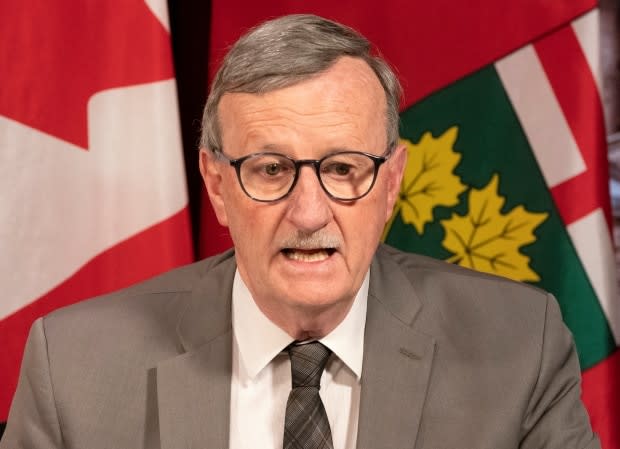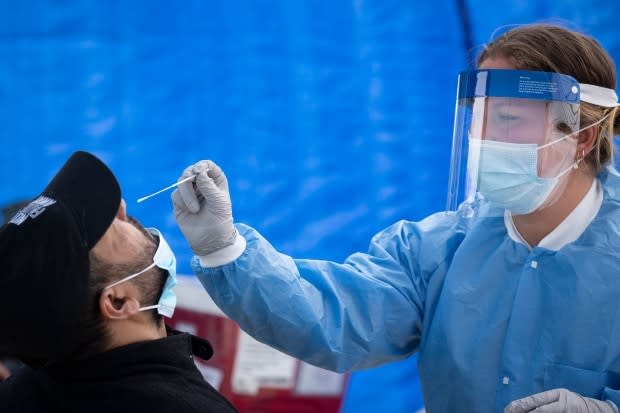Ontario's 'dog's breakfast of guidance' around COVID-19 sowing confusion, distrust, some experts say

The Ontario government's confusing and contradictory information about how people should act amid the COVID-19 pandemic is leading to some public distrust of the province's advice, several experts say.
The more precise and concise messaging at the start of the pandemic has become increasingly convoluted, they say, leaving some people frustrated as cases surge.
"It seems like they're making it up as they go," said Laura Babcock, owner of the communications firm Powergroup Communications.
That seemed to be the case at Friday's provincial COVID-19 news conference, when reporters repeatedly asked if families should gather for Thanksgiving next weekend.
The press conference came just as the province issued a news release saying that it is "pausing social circles" and advising Ontarians to "allow close contact only with people living in their own household."
Instead of echoing that advice, Premier Doug Ford, Health Minister Christine Elliott and other health officials all gave responses that seemed to contradict it.
WATCH | Ford introduces further restrictions:
Elliott said to keep gatherings "as small as possible." Provincial Medical Officer of Health Dr. David Williams told people to "use precautions" and "hunker back down, pick your ones carefully."
"Keep your circles tight, I think that's what he's getting at," Ford said about Williams's comments.
Babcock says some of the information about gathering size made little sense, especially since bars, clubs, banquet halls and even casinos are still open throughout the province and people are allowed to gather there — albeit with physical distancing measures in place.
"They're trying to have it all ways, and what it is doing is sowing mass confusion," she said. "It's painful. They've just made it worse.
"I'm trying to not use profanity here. It's a dog's breakfast of guidance."
Province defends strategy
The province says Ford and others are doing everything they can to communicate with the public through a host of platforms.
The government's experience with the first wave of the virus showed Ontarians understand what needs to be done to stem rising case numbers again, said Ford spokesperson Ivana Yelich in a statement.
Notably, Ontario's numbers only dropped after widespread lockdowns that affected many sectors of the economy. Ontario hit a new single-day record Friday with 732 new cases, and infections have risen steadily over the last several weeks.
Yelich said Ford and health officials continue to update the public, on top of public health advertising campaigns on TV, radio and online.
"As we confront the second wave, we will do what we have from the start: rely on all Ontarians to do what's necessary to stop the spread of COVID-19 as we take decisive action and implement our $2.8 billion fall preparedness plan to keep Ontarians safe," Yelich said.

Dr. Michael Warner, medical director of critical care at Michael Garron Hospital in Toronto, says it's long past time for the public to hear directly from the panel of health experts advising provincial officials, which Ford and other officials have repeatedly referenced during news conferences.
"To say that we have a fall preparedness plan, we know what we're doing and we're ready to go but to have no clarity in terms of what the benchmarks are, what the goalposts are … leads to confusion," Warner told CBC News.
"It's building this sense of distrust that is going to permeate this second wave and make it much more difficult for the government to ask us to do things that are maladaptive — that are hard."
Criticism of medical officer of health
A sticking point for some has been Williams, who routinely gives long-winded answers at news conferences that are difficult to understand. Asked on Friday if the province would start releasing data to back up the decisions it makes, Williams spoke at length but in the end, did not answer the question.
Williams was appointed by the previous Liberal government in February 2016. He was previously the medical officer of health for the Thunder Bay District Board of Health.
Doris Grinspun, CEO of the Registered Nurses Association of Ontario, has called for Williams to be taken off the job.
Dr. Colin Furness, an infection control epidemiologist and assistant professor at the University of Toronto, also says Williams needs to step down.
"There is not nearly enough attention on the damage [on the messaging and scientific front] he is doing … and I am not the only one saying this. It is absolutely crazy," Furness told CBC News.
"This is a disaster. His term is up in February. The best that we can hope for is he feels that he's got to leave."

When asked about Williams's ability to clearly communicate information about COVID-19 measures to the public, Yelich said he and Dr. Barbara Yaffe, the associate medical officer of health, "continue to update the public every single week."
Ford defended Williams at a news conference in September, saying he "has worked around the clock."
"This man doesn't sleep. He's out there protecting the people and the numbers speak for themselves," the premier said.


